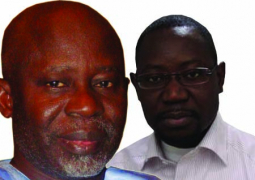The Banjul High Court presided over by Justice Abi on Monday adjourned the case of former Works Minister Ousman Badjie, for ruling on the admissibility of a letter sent to the Ministry of Foreign Affairs, after the incident of Faisal Bojang.
When the case was called, L.S. Camara represented the accused while A.M. Yusuf represented the state.
Continuing his testimony, Ousman Badjie said he wrote a letter addressed to the permanent secretary for the Ministry of Foreign Affairs.
He started with the report of the deputy head of chancery addressed to the Director of National Treasury, in accordance with the financial instructions 341.
“I attached the complaint I lodged to the police, as well as the note verbal sent to the Foreign Affairs Ministry in Paris. The copy of the forged cheque and a printout of our bank statement and I also quoted the deputy head of mission saying her signature was forged by Faisal Bojang,” Badjie said.
He said having highlighted all that, he recommended to the PS for Foreign Affairs to tell the Director of Treasury to report the matter to the police Interpol office in Banjul.
The letter together with other attachments was shown to him in court, and he confirmed it to be the one he wrote. L.S. Camara then applied to tender the documents in court.
However, state counsel A.M. Yusuf objected on the grounds that part of the letter was written in French and “it looks like a photocopy”, and that there was no name or signature on the letter.
In response, L.S. Camara said counsel’s objection was misconceived and he respectfully urged the court to overrule it.
He said counsel had no right to object to the admission of the document even if the document was a secondary document.
He added that counsel had been served with notice to produce the documents, and the letter was stated in the notice to produce documents.
He said the document is an original copy made through a uniform process evident on the document.
Counsel referred the court to a section of the Evidence Act to support his argument.
About the document being written in French, counsel said that submission is misleading because the entire document is in English and that the witness had said that he attached a note verbal to the letter of 25 February, which was in French.
He said that even if the note verbal was not translated, counsel had not cited any law that if a document was not translated in the language of the court it is inadmissible.
It would only go to affect weight and not admissibility, he said, adding that the note verbal was transmitted, and the original version was attached and the cheque, which is in French, was also translated, hence the objection was misconceived.
“The document is relevant and relevance is a very important determinant for the admissibility of documents, so that the court could do substantial justice.”
Counsel urged the court to overrule the objection and admit the document.
At that juncture, Justice Abi asked them to take a date for ruling and continuation of hearing.
The case continues on 16 July 2015.



